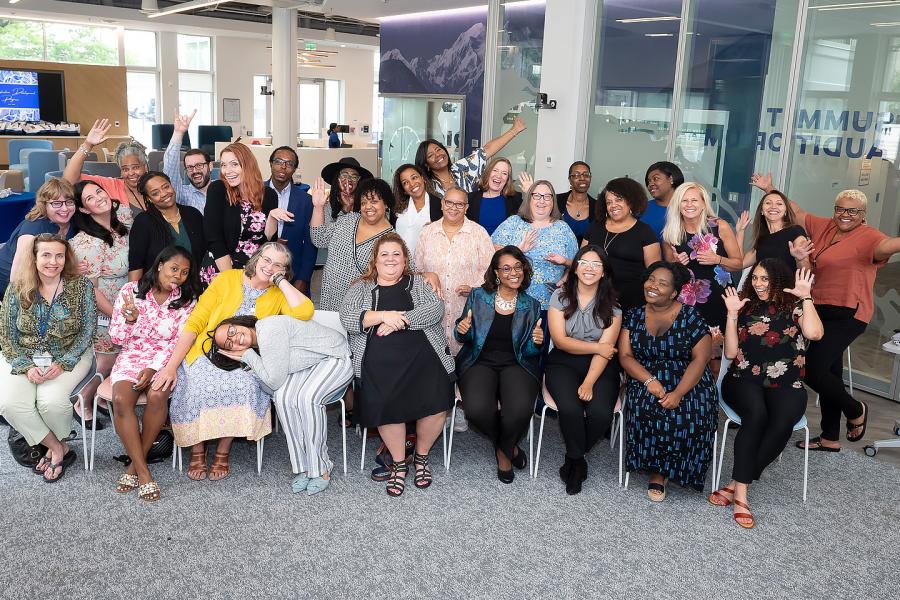In the final minutes of the classic 1939 film The Wizard of Oz, Dorothy Gale—stuck in Oz—is desperate to get back home to Kansas. Hoping the magic in the ruby slippers will transport her there, she asks Glinda, the Good Witch of the North, for help. Glinda tells Dorothy she can do it on her own. "You've always had the power," Glinda says. "You just had to learn it for yourself."
That's one of the important messages for those who take part in Johns Hopkins University's Administrative Development Program, and Jane Chase, a mentor with the program, wants them to know it. That's why she likes to share the story of Dorothy and the ruby slippers.
"Participants are in the program because they are talented and knowledgeable, looking for personal and professional growth, but don't realize it's already in them," says Chase, executive assistant and office manager in the Office of the General Counsel. "They already have the skills it takes. The program opens their minds to what is possible at Hopkins beyond what they are doing and gives them the confidence to go for it."
The ADP is a selective, eight-month program for high-potential administrative professionals, developed in 2018 at the request of the President's Office, with the goal of enhancing the critical tools needed to advance to senior-level administrative roles. The participants have a monthly class; assignments between sessions that focus on self-reflection; and a monthly meeting with their mentors, university employees who volunteer to participate. They also have access to—and are encouraged to listen to—a series of 10-minute podcasts on various relevant topics.
Participants are proposed by their managers or can be self-nominated; the final cohort is determined by a selection committee formed by Kathy Forbush, executive director of Talent Management. The process is underway now for the incoming sixth class, slated to begin the program mid-September.
"Administrative professionals are the backbone of an institution. They make it work," says Ann Shiu, who developed the program with colleague Siyade Gemechisa, both of whom are senior instructional designers. "This program is to showcase the skills they have been working on their entire careers, to build their confidence so that they are ready for the next step and to help them find their voice to do so."
Fifty-two participants—both men and women, from 14 divisions across the university—have now completed the program, with 25 receiving promotions and five moving laterally.
"The university wanted to create a pipeline of people already here who knew the Hopkins culture and could be groomed to take on exec-level roles," Gemechisa says. "We're also trying to build a learning community and a network; everyone who goes through this program gets added in. We've created this safe community where they all feel they can always rely on each other."
This certainly has been the experience of Dynita Washington, an executive specialist at Johns Hopkins Technology Ventures. She has served as a volunteer instructor for three of the five courses for the past two years, sharing her insights with participants.
"Becoming a facilitator boosted my confidence and helped me to realize that I am an expert in this field and I had something worthwhile to share to help others who are on this career track," she says. "I want to see others take pride in their work and advance to their highest potential. This opportunity also introduced me to many other administrative professionals across the various schools that I might not have contact with otherwise. When I joined the program, my work community expanded instantly. I knew I could reach out to them when I have a question or need some work-related advice."
Those who are chosen for the program must have at least one year's work experience at Hopkins, have consistent "above average" to "excellent" performance evaluations, and be deemed to have a high degree of potential—even if they themselves don't realize it at first.
"We want to cultivate talent from within," Shiu says. "We need to have people who understand the Hopkins culture that people we can bring in from the outside might not understand. This is a program for high-potential administrative professionals."
Jamie Karl was a senior administrative coordinator to the vice president for human resources when she was tapped to join the first cohort.
"[The program] changed my life," says Karl, now a senior analyst for student benefits in central Human Resources. "Before I started, it was just a job and a paycheck. I was paying my bills and cruising through life. I didn't go to college, and I thought this was as good as I was going to get. I wasn't reaching for the stars because I didn't think there were any stars to be reached."
However, as she went through the program and dug deep into the classes, "it gave me the confidence I needed to know that I truly was more than an old-time secretary," she says. "Prior to this program, I felt that's what I was. It was just day to day. But once I got into the program, it was Wow Jamie, you know stuff. They really showed me my worth … that I had it in me all along."
Chase, who is Karl's mentor, says she gets as much out of participating as her mentees do. "I've been involved as a mentor for a few years, and every meeting with a mentee gives me a new perspective on what I do," she says. "It's a privilege to be a part of that learning and growth."
Shiu says that the mentoring experience actually got some of the mentors thinking about the same issues they were working on with their mentees and has inspired some of them to go after promotions and get them. "We've heard time and time again from our mentors: It's worth it to me because someone did it for me and because it is helping my own network grow. I know they can do this work and want to encourage them to go for it."
Ashley Graham, the learning program coordinator, serves as a liaison to the participants and is involved in managing the logistics and continuity of the ADP. She sees it as an important way to consolidate the lessons that top-level administrators have gained throughout their careers—and pass them along to others. "There are all those little things you learn throughout your career, and no one writes them down," she says. "There is no template. This helps create one. It's also a recognition on the part of the university as to how important administrative staff members are."
The coursework focuses on a number of topics—communication being chief among them—designed to elevate administrators and increase their self-confidence, Gemechisa says. Sessions include the Ultimate Professional, Strengths Finder, Work Wise, and Executive Assistant: A Day in the Life.
Washington has taught several of these. "In my role, it's important for me to prepare my executive with as much relevant information as possible so she can be ready for various business scenarios such as meetings, presentations, panels, interviews, and ceremonies," she says, adding that she spent time explaining to the "students" the purpose of briefings and how to prepare them. "I could see their faces light up," she says. "They were intrigued and asked lots of questions. I think they were grateful for this particular lesson because it added a useful tool that they could take back and offer in their own workplace."
One course features a critical exercise that helps participants identify both their personal work style and that of their colleagues. "Are you a sprinter? Or a marathoner? A morning person or an afternoon person?" Gemechisa says about the thinking behind it. "Marathoners like to work steadily on things, until they are done; sprinters need a deadline and may not work on [a project] until it's due. It's important to recognize your style, and that of others. Many things can go wrong when you make assumptions. Having self-awareness of your own style helps you understand other people as well."
Another exercise—called Is It a Fire or a Drill?—uses various scenarios to encourage participants to try to distinguish between a true emergency that could be panic-worthy or a problem that can be solved with a certain level of calm. The goal is to teach administrators that their growing experience will help them realize that most crises are the latter, not the former. "[The participants] start talking to each other, getting new tips and exchanging ideas," Gemechisa says. "There is so much informal learning going on. [An event] can be either a fire or a drill, but getting them to start thinking through the concept allows them to take a step back and assess how they will handle it."
She provides an example: It's Friday at 2 p.m., and an important meeting with top executives is set for Monday morning. "You just got a call that the catering service will be closed on Monday," Gemechisa says. "For a new person, that might be a raging wildfire, but a more seasoned person, having been there before, will look at it as a drill. We are trying to instill confidence so they can navigate all the things that can happen."
The end result is an administrator "who can run a tight ship and know when something is a fire or a drill, regulate their own emotions, know how to communicate, and understand their own and their manager's work style," Gemechisa says. "They will have a clear sense of their own boundaries and can command respect. Even though you are an assistant, you will be relied upon to make critical decisions and solve problems. Your executive, for example, doesn't want to ask Where do I park? The executive assistant will anticipate this, block out travel time, and say Here's where you park, and here is your parking pass. All leadership has to do is show up. When a dean is looking at you, you have to feel you are on top of things."
The program recently held a fifth anniversary celebration and about 30 graduates came, Graham says. "Most of them had had at least one promotion, and some had had multiple promotions, and they all said that what they learned was pivotal to them," she says.
Washington says she has been thrilled with the program's impact and her role in it.
"I am proud of the courage [the participants] have shown to take steps to advance in their careers and [of my] helping Hopkins' pool of administrative professionals to grow stronger and deeper," she says. "I've seen a big transformation in many of the participants. Some of them came into the program reserved and laid back. However, when I talked to them after their cohort ended, some shared changes they've made in their careers. Some started having more in-depth discussions with their supervisors about their careers; others have pursued promotions and attained them."
Karl is one of them. Since completing the program, she has been promoted twice, the first time only one week after her session ended. She sought that position with a newfound zeal inspired by the program—and without the wizardry of a good witch or special red shoes.
"I went to my boss and said, 'I want a promotion,'" she says. "I reached deep inside of myself for the feeling that I deserved it. The program helped me boost my confidence and my self-worth. It really sparked something in me. I wanted more. I love what I do now. I wanted to be senior staff when I retired, and I'm already there. I finally looked—and there were stars."
Posted in News+Info









